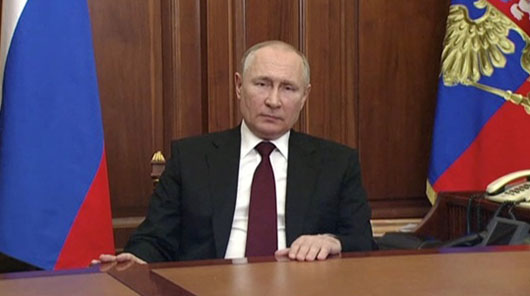FPI / February 23, 2022
Geostrategy-Direct
Analysis by Gregory R. Copley, Editor, GIS/Defense & Foreign Affairs
Why did the U.S. Joe Biden Administration choose this time to cause Russian President Vladimir Putin to trigger recognition of the sovereignty of two small regions in the south-east of Ukraine?
That President Putin acted at this time, and the manner in which the recognition occurred, was an enormously defensive move, rather than an offensive one. It also made irrevocable the political tendencies in the U.S. (in particular) which ensured that post-Soviet Russia would not, seemingly ever, be allowed entry into “the West”.

The Russian President’s speech on Feb. 21, 2022, in which he recognized — with some sadness and anger — the sovereignty of Donetsk and Luhansk, asked of the U.S.: “Why was it necessary to make an enemy out of us?”
So Russia’s Feb. 21, 2022, move reinforced the reluctant alliance between Moscow and Beijing as they each sought, for their own sovereign purposes, the retreat of the U.S. from the world stage.
That U.S. tendency to isolate Russia was in line with the rejection by the U.S. center-left of the promises made by U.S. President Ronald Reagan (1981-89), with British Prime Minister Margaret Thatcher (1979-90), to help free the Russian population and integrate post-Soviet Russia into the West. So, in many respects, this U.S.-led attempt to “continue the Cold War” by insisting that post-Soviet Russia was the same as the former Soviet Union ideologically and geopolitically, was a creature of U.S. domestic political factionalism.
The U.S. political rejection of post-Soviet Russia is embraced by the so-called “neo-con” (neo-conservative) movement which had emanated from the Democratic Party’s conservatives and elements of the Republican Party’s right, particularly under the two George (H.W. and W.) Bush presidencies. Both elements rejected Reagan’s and Thatcher’s approach, which was to declare victory and move forward, and instead insisted on treating the collapse of the USSR as merely a step in an eternal Cold War. And today’s U.S. anti-Russia activists also include extreme left elements who recognize that post-Soviet Russia removed the communist Soviets.
Russia could have recognized the sovereignty of the great coal-mining regions of Donetsk and Luhansk, with the overwhelming support of the local population of those two regions — which comprise the greater Donbas region — at almost any time since 2014 when the “Maidan Revolution” broke Ukraine into warring factions. It is now no secret that the U.S., along with some European Union (EU) elements, covertly and overtly supported the Maidan affair as a means of breaking historical Russian links with Ukraine. And to call them just “links” is a profound understatement.
The New York Times’ Moscow correspondent on Feb. 21, 2022, noted: “By seeking to redraw the post-Cold War boundaries of Europe and force Ukraine back into Moscow’s orbit, Mr Putin is attempting nothing less than to upend the security structure that has helped maintain an uneasy peace on the continent for the past three decades.”
But that is, in fact, a reversal of strategic reality. The U.S., after the Reagan presidency, led the North Atlantic Treaty Organization (NATO) into a reversal of the promised policy to end NATO expansion. Indeed, NATO had essentially lost its mission when the Warsaw Treaty Organization (WTO) and the Soviet Union collapsed. NATO today exists without its original mission and its Director-General, Jens Stoltenberg, has lobbied hard to portray NATO expansion as necessary to “counter” post-Soviet Russian expansion.
It is true that, since 1991, NATO has expanded Eastward, but Russia has not expanded Westward.
It is equally true that Ukraine as a formal geopolitical and sovereign state has an ambiguous background, and had never before in modern times been a truly sovereign entity.
Full Text . . . . Current Edition . . . . Subscription Information
Free Press International News Service
